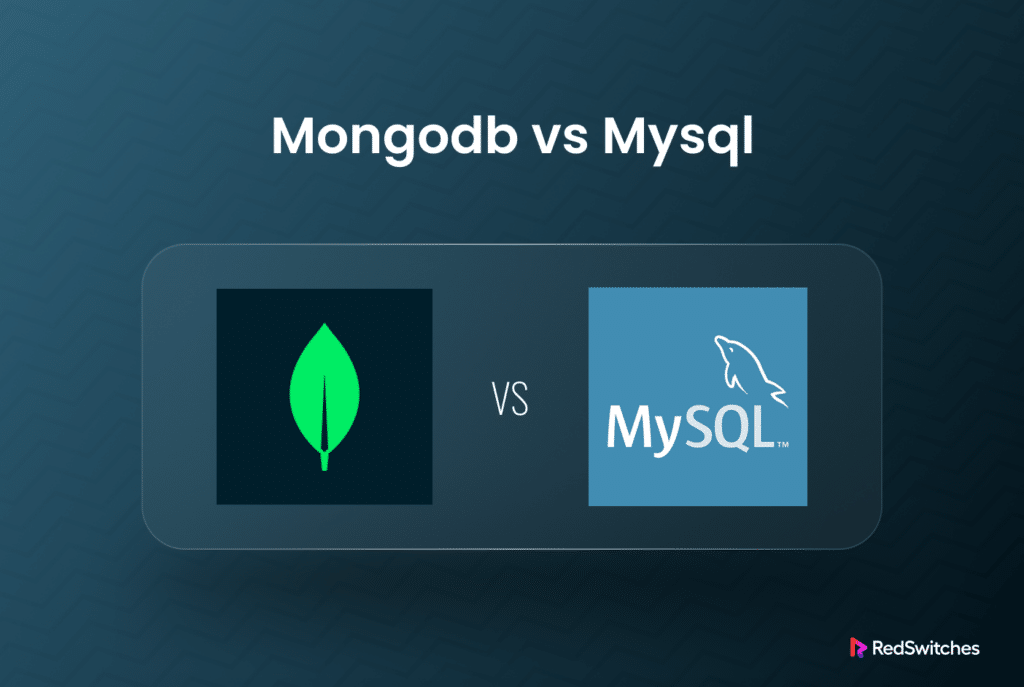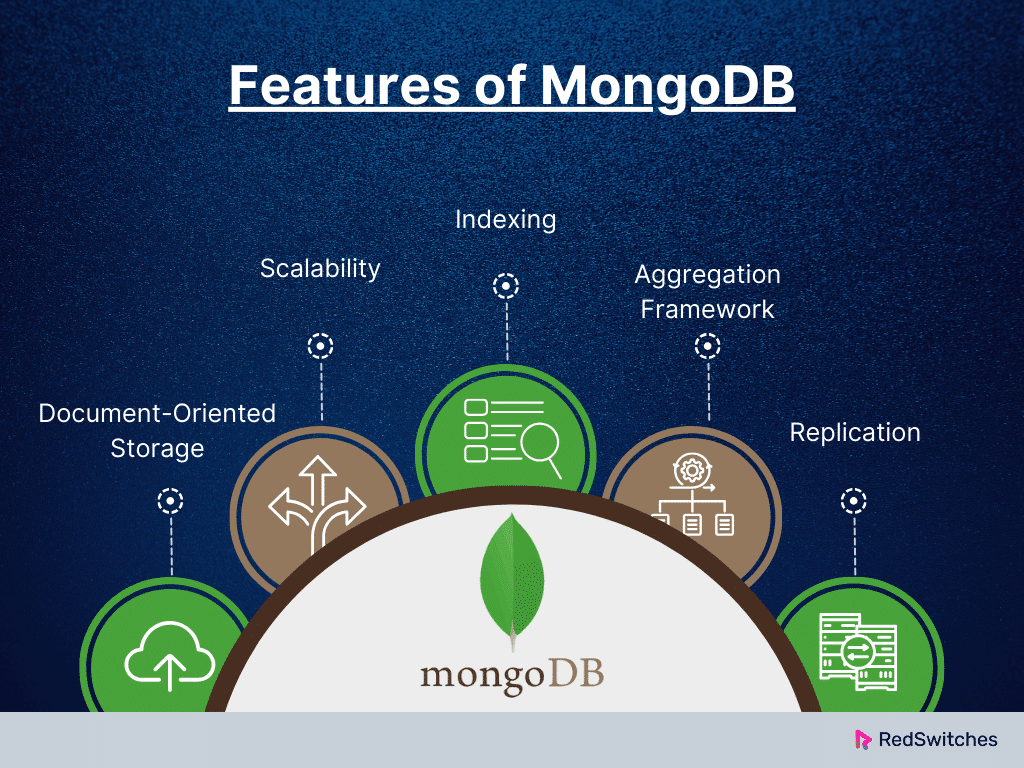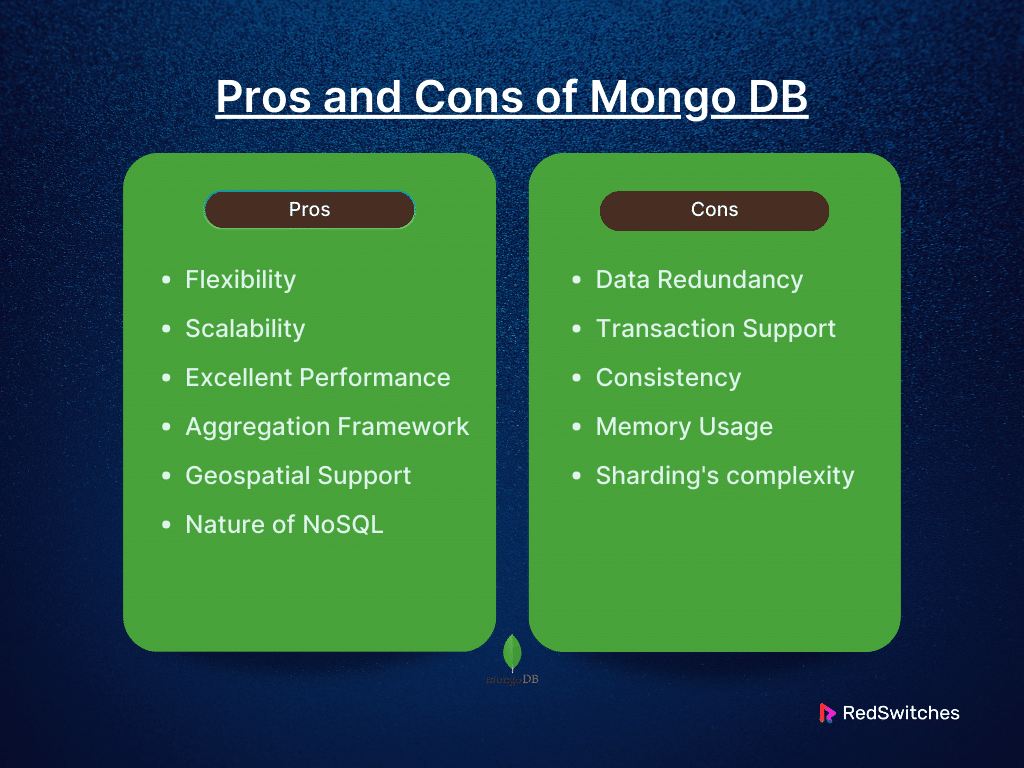Key Takeaways
- MongoDB is optimal for dynamic data models; MySQL excels in structured data integrity.
- MongoDB supports easy horizontal scaling; MySQL scales vertically and is complex to scale horizontally.
- MongoDB excels with unstructured data; MySQL is optimized for complex relational operations.
- MySQL provides robust ACID-compliant transactions; MongoDB has more limited transaction capabilities.
- MongoDB uses JSON-like queries; MySQL supports complex SQL queries for deep analytics.
- Both have strong communities; MongoDB is popular in modern apps, and MySQL in traditional uses.
- Both offer strong security but differ in testing approaches due to their architectural differences.
The success of your project may depend much on the database system you pick. The field of database tech is always changing. They each have advantages and disadvantages. MongoDB vs MySQL are two of the most popular options.
MongoDB is a popular NoSQL database. It is flexible and scalable. It is for managing massive amounts of unstructured data. However, MySQL’s well-known SQL database offers performance and resilience when handling structured data.
This article compares both databases in great detail. It will help you understand their features and make an informed choice. The key to maximizing your project’s potential may lie in understanding these databases. This applies whether you’re building a fast backend system or a dynamic web app.
Table of Contents
- Key Takeaways
- What is MongoDB?
- Features of MongoDB
- Pros & Cons of MongoDB
- What is MySQL?
- Features of MySQL
- Pros & Cons of MySQL
- Key Differences: MongoDB vs MySQL DBMS Comparison
- MongoDB Vs MySQL: Scalability
- MongoDB Vs MySQL: Data Replication
- MongoDB Vs MySQL: Ease of Use
- MongoDB vs MySQL: Security
- MongoDB vs MySQL: Speed
- MongoDB vs MySQL: Indexing
- MongoDB vs MySQL: Architecture
- MongoDB vs MySQL: Learning Curve
- MongoDB vs MySQL: Community and Support
- MongoDB vs MySQL: Testing
- Which is Better: MongoDB vs MySQL
- Conclusion
- FAQs
What is MongoDB?
Credits: MongoDB
Strong NoSQL database management system MongoDB is open-source. It is renowned for its quick scalability, high availability, and high performance. In contrast to relational databases, which keep data in rows and tables, MongoDB uses a flexible document-oriented strategy. This means data is stored in documents that look like JSON. They have dynamic schemas (BSON in MongoDB). This speeds up data integration in some apps.
One of MongoDB’s most notable features is its schema-less architecture, which permits each document in a collection to have a unique structure. Applications that deal with massive volumes of quickly changing data kinds and formats may significantly benefit from this flexibility. In most programming languages, the document model maps directly to objects, simplifying the code and lowering the application’s impedance mismatch with the database.
MongoDB offers robust methods for accessing and analyzing data by supporting various query models, aggregation, and indexing techniques. In addition, it has high availability, horizontal scaling via sharding, and built-in replication. These capabilities are needed by systems that need to be dependable and manage enormous volumes of data dispersed across numerous servers.
MongoDB offers a robust ecosystem of tools and services, including its fully managed cloud service, Atlas. This makes maintenance and setup duties easier, enabling developers to deploy, run, and scale MongoDB databases on the cloud without handling the underlying infrastructure.
Features of MongoDB
Because of its many features, MongoDB is a well-liked option for developers and businesses. Here’s a closer look at a few of its main characteristics:
Document-Oriented Storage
MongoDB stores data as BSON (Binary JSON) objects on documents. This approach is adaptable; it does not require a set schema and permits changing fields and structures inside documents. Thanks to this flexibility, development may be completed more quickly and easily, especially for applications handling dynamic and different data sources.
Scalability
Scalability is a critical consideration in MongoDB’s design. It facilitates horizontal scaling through sharding, which divides data among several servers or nodes. This can significantly expand a database’s capacity without sacrificing its functionality. Applications can see right through sharding, which is automatically maintained by MongoDB’s configuration choices.
Indexing
You can index any field in a MongoDB document to enhance query performance. To optimize various kinds of queries and operations, MongoDB provides specialized index types like text, geospatial, and hashed indexes in addition to supporting primary and secondary indices.
Aggregation Framework
MongoDB has a robust aggregation framework that lets you handle and change complex data inside the database. This framework can process data in numerous steps, akin to a pipeline, by combining different operators and stages, such as filtering, grouping, and sorting.
Replication
MongoDB’s replication capability offers high data availability by copying data between several server instances. Replica sets, a collection of mongod processes that manage the same data set, are what enable this replication. Replica sets provide the system’s resilience to hardware failure and aid in failover protection.
Pros & Cons of Mongo DB
Pros of MongoDB
Let’s have a look at the Pros of MongoDB.
Flexibility
MongoDB enables a variety of dynamic schemas by storing data in documents that resemble JSON. Due to its flexibility, storing unstructured, semi-structured, or structured data is simple, and changing the schema is done quickly and without causing any downtime.
Scalability
Its design includes horizontal scaling through sharding and replication, making it appropriate for applications with substantial data volumes and room for expansion.
Excellent Performance
MongoDB provides excellent read and write performance. Because of its indexing capabilities, queries can be completed more quickly, and it can manage several requests at once.
Aggregation Framework
Rather than transferring data to different analytics systems, the integrated aggregation framework is a potent tool for carrying out intricate transformations and analyses inside the database.
Geospatial Support
One significant benefit of location-based services and applications is that MongoDB supports geospatial data and queries.
Nature of NoSQL
Because it is a NoSQL database and does not impose strict schema constraints, it is well-suited for applications that must rapidly adapt to changing technological and business requirements.
Also Read What Is Schema In Database? Breakdown of 9 Key Aspects
Cons of Mongo DB
We will now focus on the Cons of Mongo DB.
Data Redundancy
Because MongoDB is denormalized, it may use more storage capacity than normalized SQL databases because the same information may appear twice in different documents.
Transaction Support
MongoDB’s transaction capabilities are not as developed as those in traditional relational databases. This might be a downside for applications requiring complicated transactions, even if current versions have added support for multi-document transactions.
Consistency
Data may become outdated for a while when using MongoDB’s eventual consistency approach for replication. Applications needing high consistency assurances might find this unsuitable.
Memory Usage
RAM has a significant role in MongoDB’s performance. When the working set fits into memory, it operates at its optimum. Memory can be costly, especially for more extensive databases.
Sharding’s Complexity
Although sharding allows for scalability, establishing and maintaining a sharded environment can be difficult and need careful preparation and implementation.
What is MySQL?
Credits: Flickr
One of the most popular relational database management systems (RDBMS) that is available for free is MySQL. It was first created by MySQL AB, a Swedish business that Oracle Corporation eventually purchased. MySQL is essential to LAMP (Linux, Apache, MySQL, PHP/Python/Perl). It is often used for making dynamic websites and web apps. It is a cornerstone of many contemporary web applications.
Fundamentally, MySQL stores information in tables arranged into databases. Every table has rows and columns, each denoting a single record and each column defining a particular property. MySQL uses structured query language (SQL). SQL is an internationally recognized standard for managing relational databases.
Security is a major feature of MySQL. It has many layers of security. It does host-based verification. It supports SSL for encrypted connections. It has fine-grained access control to database objects. Because of this, it is a dependable option for applications that must protect sensitive data.
MySQL can manage many concurrent database connections and is very scalable. It is used in applications ranging from tiny to large-scale enterprise applications. MySQL has storage engines. They include MyISAM, known for its fast reads. InnoDB supports foreign keys and transactions.
Features of MySQL
MySQL has many features. It is a feature-rich relational database system. It can be used for small or large projects. Here’s a thorough examination of some of its salient characteristics:
SQL Compatibility
MySQL uses SQL (Structured Query Language), the foundation of all relational database interactions. Because SQL is widely used and standardized, working with data is simple for developers of all experience levels. MySQL is flexible. It can handle tough queries, like joins, subqueries, and views. It can be tailored to meet simple or complex app needs. It adds proprietary extensions to conventional SQL to improve functionality and performance.
Storage Engine Flexibility
MySQL’s architecture allows users to select from several storage engines. They choose based on the application’s requirements. InnoDB is one of the most widely used engines. It offers row-level locking for more concurrency. It also supports foreign key constraints and completes ACID-compliant transactions.
Replication
MySQL’s replication features are essential for improving load balancing and data availability. The read and write tasks are divided across one or more slave servers. The master server can handle all write activities in a master-slave replication arrangement. This disperses the burden. This is especially helpful in settings where many read queries must be fulfilled. It is also useful where data redundancy and hardware failure resilience are needed.
Partitioning
MySQL supports horizontal partitioning. It makes it easier to manage huge tables. It divides them into smaller, more manageable chunks. This is done without changing the application’s logic. This can significantly boost performance for read-heavy apps. This is especially true if partitions are created around often-used data.
Features Related to Security
MySQL has a robust security model with several levels of defense. Data in transit is protected against interception using SSL/TLS encrypted connections. Data-at-rest encryption can be set up to safeguard private information kept on disc.
Pros & Cons of MySQL
Pros of MySQL
Many benefits make MySQL, a well-liked relational database management system, a top option for developers in various sectors. Here’s a thorough analysis of the main benefits of utilizing
Widely-Adopted
MySQL is a widely used database with solid community support. It is utilized by major internet companies such as Facebook, Twitter, and YouTube. It is one of the most popular databases worldwide. Thanks to its enormous user base and vibrant community, many tools, resources, and forums are accessible for troubleshooting, optimization, and learning. Both seasoned developers and novices find MySQL a compelling choice because of its vast support network.
Expense Effectiveness
MySQL is a cost-effective option for startups and organizations seeking to reduce IT expenses. It is free-to-use and open-source software under the GNU General Public Licence. MySQL offers several affordable paid editions that are competitively priced compared to competing corporate database options, even for larger enterprises that want sophisticated capabilities.
Compatibility with All Major Languages and Platforms
MySQL is compatible with almost every central platform, including Windows, Linux, and Mac OS. It is adaptable for various application development types and ensures smooth system operation because it interacts readily with all leading programming languages and development environments.
High Performance
The speed and dependability of MySQL are well-known. It may be set up for optimal speed using various caching and indexing techniques, and it efficiently manages massive data volumes. Transactional support from advanced storage engines like InnoDB for business-critical applications further improves performance and dependability.
Strong Data Security
MySQL has robust data security features, such as data-at-rest encryption, SSL/TLS support, and encrypted connections. Its access control mechanism allows for precise user privilege definition, which aids in implementing strict security regulations and shielding private information from unwanted access.
Also Read Exploring Data-at-Rest Encryption: How It Works, Types, Best Practices & Top Trends
Cons of MySQL
Although MySQL has many advantages, its disadvantages may make it unsuitable for some situations or applications. Here is a thorough analysis of a few drawbacks of utilizing MySQL:
Limitations on Performance Scaling
While MySQL is scalable for many applications, systems with exceptionally high transaction rates or extensive databases may experience performance issues. In particular, table-level locking in specific storage engines, such as MyISAM, may cause performance bottlenecks in write-intensive settings or applications requiring large concurrent writes.
Managing Complexity in Large-Scale Data Warehousing
MySQL’s primary purpose is online transaction processing (OLTP), which means that there are more efficacious systems for online analytical processing (OLAP), which data warehousing uses. Complex query optimization and indexing techniques are needed to handle large-scale data warehousing; alternative databases designed with these needs in mind may better handle these tasks.
Partial Support for Advanced SQL Capabilities
Compared to other RDBMS like PostgreSQL, MySQL has been slower to adopt several advanced SQL capabilities, even though it still supports most fundamental SQL capabilities. Some features, like window functions, full outer joins, and common table expressions, are either unsupported or were added only in subsequent versions.
Managing Extremely Large Databases
Managing databases with MySQL can become more complex as they grow. Problems like data consistency, backup and recovery, and performance optimization demand additional work and resources, which may mean considering alternative databases to manage massive amounts of data more effectively.
Problems With the Default Setup
MySQL’s default setup is not optimized for maximum performance, and novice users may not adjust the parameters sufficiently for their particular use case. This may result in less-than-ideal performance right out of the box, especially in settings with unique requirements.
Key Differences: MongoDB vs MySQL DBMS Comparison
In this section, we will discuss the core of our blog, namely, the 10 critical differences in the MongoDB vs MySQL debate.
MongoDB Vs MySQL: Scalability
Explore how MongoDB and MySQL handle large-scale database operations and their ability to grow with your business.
MongoDB
MongoDB has a distributed architecture, manages massive data sets well, and was made with scalability in mind. One of MongoDB’s key scalability advantages is support for horizontal scaling through sharding. Sharding spreads data over many servers, reducing strain on one server and speeding up queries.
MySQL
Adding extra power (CPU, RAM) to an existing computer expands its capacity. This is known as vertical scaling. MySQL has historically been good at this. In contrast to NoSQL databases like MongoDB, it may also allow scaling horizontally to some level. This is mainly through sharding and replication. But, these features are seen as more complex and less integrated.
MongoDB Vs MySQL: Data Replication
Compare the data replication difference between MongoDB and MySQL to understand which offers more robust data safety.
MongoDB
MongoDB uses replica sets. They use them to ensure data is available and redundant. In MongoDB, a replica set is a group of mongod processes. They automatically failover and provide redundancy by keeping the same data. A replica set usually comprises several secondary nodes in addition to the central node. The primary node handles all write activities before replicating the data to the other nodes.
MySQL
MySQL’s primary replication method is a master-slave setup. The master is used for all writes. One or more slaves are kept in sync and mainly used for reads. This configuration enhances read performance and distributes the load among several servers.
Also Read What is Server Redundancy? Definition and 5 Main Benefits
MongoDB Vs MySQL: Ease of Use
Which is more user-friendly MongoDB or MySQL? Let’s find out by focusing on their interfaces and the simplicity of managing databases.
MongoDB
Frequently commended for its user-friendliness, MongoDB’s flexible schema design is mainly responsible for this. Because of this flexibility, developers can save documents in a format similar to JSON and with a variable structure. This makes it possible to deal with data dynamically without predefining the schema. The database schema does not need to change to alter the data structure. This can significantly speed up development.
MySQL
Additionally well-known for its user-friendliness, MySQL boasts a sizable user base thanks partly to its simple setup and administration. It uses the popular SQL language, supported by several educational resources and known to most developers. This facilitates learning and efficient use for novice developers.
MongoDB vs MySQL: Security
Credits: Freepik
Examine the security measures and protocols each database offers to protect your data from unauthorized access.
MongoDB
MongoDB provides a robust security model intended to safeguard data in multiple ways. It supports Secure Sockets Layer (SSL) and Transport Layer Security (TLS), which encrypt data as it moves across the network to guard against manipulation and eavesdropping.
MySQL
To protect data, MySQL also offers an extensive feature set of security measures. It helps prevent data from being intercepted during transmission by supporting SSL encryption for data in transit. To further improve the security of data exchange procedures, MySQL additionally provides encrypted connections via a number of different protocols.
MongoDB vs MySQL: Speed
Evaluate the MongoDB vs MySQL performance and speed in processing large datasets and complex queries.
MongoDB
This database is well-known for its outstanding performance, especially when dealing with substantial amounts of semi-structured or unstructured data. Fast data insertion is made possible without the overhead of changing table schemas because of its document-oriented data model, which supports dynamic and flexible schemas. Since this paradigm does not impose strict relational structures, it naturally supports faster writing.
MySQL
As a relational database management system, MySQL performs well in settings that call for transactional solid integrity and sophisticated query capabilities. Because SQL is structured, it can be extensively optimized, which makes MySQL especially quick for processing complex queries, including normalized data structures.
MongoDB vs MySQL: Indexing
Look at how MongoDB and MySQL handle indexing to enhance search operations and database efficiency.
MongoDB
MongoDB’s indexing features are intended to improve efficiency throughout its document-oriented architecture, enabling effective data management and retrieval. Numerous index types are supported, such as compound indexes for multiple fields, single-field indexes, and unique indexes for array data (multikey indexes). MongoDB also provides text indexes to enable full-text search within documents and geospatial indexes for location-based querying.
MYSQL
In MySQL’s relational database environment, indexing is a crucial component for maximizing query performance and effectiveness. MySQL mainly uses indexes to find rows with particular column values fast, which minimizes the requirement to look through each item in a database table. For instance, the primary key index speeds up data retrieval and aids in the unique identification of a record.
MongoDB vs MySQL: Architecture
Delve into the fundamental architectural differences between MongoDB and MySQL and what they mean for users.
MongoDB
Unlike conventional relational database systems, MongoDB is based on a document-oriented data model, which is the foundation of its architecture. Data in MongoDB is stored in BSON (Binary JSON), a versatile JSON-like document format that allows each document to have its own structure.
MySQL
In contrast, MySQL uses tables to store data in a traditional relational database architecture, concerning a rigorous schema specifying the table structure, including the columns, data types, and interrelations—constraints that preserve data integrity and relationships across tables (e.g., foreign keys)—the data in MySQL is stored in rows and columns.
MongoDB vs MySQL: Learning Curve
Analyze the learning curve associated with MongoDB and MySQL, identifying which is easier to master for new users.
MongoDB
Because MongoDB uses BSON (a binary-encoded serialization of JSON-like documents) for data storage, its learning curve is very mild for developers with some experience with JavaScript and JSON. Because of this familiarity, developers find it easier to comprehend and work with data in a format that resembles contemporary online apps.
MySQL
MySQL’s learning curve is typically considered modest, particularly for individuals already conversant with relational database theory and SQL (Structured Query Language). Many relational databases employ SQL as a standard language, and the business and academic worlds frequently teach it.
MongoDB vs MySQL: Community and Support
Credits: Freepik
Assess the strength and responsiveness of the community and support networks for MongoDB and MySQL.
MongoDB
Its active and thriving community significantly increases MongoDB’s attractiveness and usability. The growing demand for scalable, adaptable NoSQL solutions and MongoDB’s compatibility with contemporary development approaches have contributed to the database’s explosive popularity since its launch in 2009.
MySQL
With a vast global community, MySQL is one of the most popular and established relational databases worldwide. Its community includes many database administrators, developers, and third-party organizations that offer tools, integrations, and extra functionality.
MongoDB vs MySQL: Testing
Review how MongoDB and MySQL accommodate testing environments, focusing on ease of setup and flexibility.
MongoDB
Because of its document-oriented data model and schema-less design, testing MongoDB applications requires different considerations than testing other systems. Developers must ensure the application appropriately manages MongoDB’s schema flexibility, especially concerning data insertion, updating, and querying.
MySQL
A distinct set of techniques is used to test MySQL, mostly centered on the database’s relational features and the integrity requirements that must be upheld. This entails verifying that the database retains consistency and integrity under various conditions by validating data normalization guidelines, foreign key relationships, and transaction management.
Let’s summarize it in a tabular format.
Which is Better: MongoDB vs MySQL
MongoDB or MySQL may be better, depending on the particular needs and project context. Every database system has unique benefits and might be more appropriate for a certain kind of application:
Use MongoDB If
- You require scalability and large write loads. Applications that prioritize scalability and have heavy write loads benefit greatly from MongoDB. It can also help large data applications and distributed systems. It has sharding and straightforward replication.
- MongoDB has no schema. This is helpful if your app needs to be adaptable. Your data’s structure may change often.
- You have lots of unstructured data. With its document-oriented method, MongoDB is great at handling unstructured data. This makes it perfect for systems with many types of documents, like content management and e-commerce.
Use MySQL If
- MySQL has strong transactions. It also has advanced relational database features. It is better for applications that need atomicity and consistency, such as financial systems.
- MySQL ensures data integrity. It uses foreign keys and transactions. They guarantee consistent links between table contents. This is for applications that need exact data structure and consistency.
- The complexity of your queries is well-known. MySQL is famous for its ability to handle complex SQL queries. These queries need many operations, like joins and subqueries. They are crucial for analytics and reporting.
Conclusion
The decision between MongoDB and MySQL is based on the project’s particular needs. When working with unstructured data in settings that demand flexibility, scalability, and quick development, MongoDB performs admirably. It is perfect for applications that need to manage large amounts of various data types or that need frequent schema changes. Nonetheless, MySQL is a mainstay in more conventional relational database contexts because it is ideal for applications that require strong transaction support, sophisticated querying capabilities, and stringent data integrity.
FAQs
Q. Is MongoDB better than MySQL?
Depending on the application’s needs, MongoDB or MySQL may be superior. MongoDB is superior in scalability and flexibility, while MySQL is superior regarding relational data integrity and sophisticated transactions.
Q. Can MongoDB replace MySQL?
A non-relational, schema-less database such as MongoDB can replace MySQL in certain situations. Still, better app options might exist for apps primarily dependent on relational and transactional functionality.
Q. Should I learn SQL or MongoDB?
Depending on your professional focus and project requirements, learning SQL is essential for comprehending relational databases like MySQL while studying MongoDB is helpful for contemporary, document-oriented database applications.
Q. What is the critical difference between MongoDB and MySQL databases?
MongoDB vs MySQL difference is MongoDB is a NoSQL database, while MySQL is a relational database. MongoDB uses a document-oriented data model, whereas MySQL uses a tabular one.
Q. How does the query language differ between MongoDB vs MySQL?
MongoDB uses a flexible and powerful query language based on a JSON-like document structure, while MySQL uses SQL (Structured Query Language) for querying data.
Q. Which database has better performance, MongoDB or MySQL?
MongoDB vs. MySQL Both MongoDB and MySQL can offer high performance, depending on the specific use case. Due to its document-based storage and query optimization, MongoDB is often considered faster than MySQL for specific applications.
Q. In what ways do MongoDB and MySQL databases perform differently?
MongoDB is known for its scalability and performance with large volumes of unstructured data, while MySQL is favored for complex queries and transactions in structured data environments.
Q. When should I choose between MongoDB vs MySQL for my project?
You should consider using MongoDB if your project requires flexibility and scalability for handling unstructured data efficiently. On the other hand, MySQL is a better choice for projects that rely heavily on structured data and transactions.
Q. What are the critical differences in the database performance of MongoDB vs MySQL?
MongoDB excels in handling large amounts of unstructured data with high performance and scalability, while MySQL is preferred for complex queries and transactional operations on structured data.
Q. Mongodb vs Mysql: Which should we choose?
Your choice between MongoDB and MySQL depends on your project’s specific requirements. MongoDB is excellent for handling unstructured data and scalability, whereas MySQL suits structured data and transactional processing.










